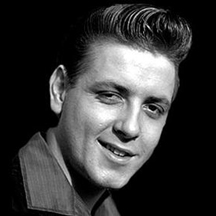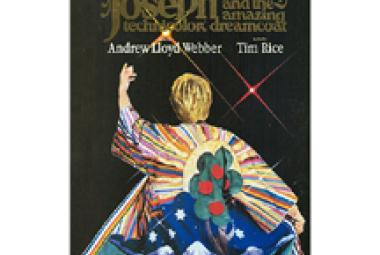Eddie Cochran (October 3, 1938 – April 17, 1960) was an American musician. Cochran’s rockabilly songs, such as “C’mon Everybody”, “Somethin’ Else”, and “Summertime Blues”, captured teenage frustration and desire in the late 1950’s and early 1960’s. He experimented with multitrack recording and overdubbing even on his earliest singles, and was also able to play piano, bass and drums. His image as a sharply dressed and good-looking young man with a rebellious attitude epitomized the stance of the 50’s rocker, and in death he achieved an iconic status when he died aged 21 after a road accident. (More from Wikipedia)
Chuck Berry had previously been a part of Alan Freed’s touring “Biggest Show of Stars for 1957” that had a truly amazing lineup: Fats Domino, the Everly Brothers, Buddy Holly, LaVern Baker, Eddie Cochran, the Spaniels, the Drifters, Clyde McPhatter, Paul Anka, Frankie Lymon, and others.
* * *
Ritchie Valens released just two 45’s but still showed incredible versatility. His first, “Come On, Let’s Go” is now regarded as a straight-up rock and roll classic, but it failed to chart. Writing in 1998, Billy Vera recalls “first hearing [“Come On, Let’s Go”] on Alan Freed’s TV Dance Party, a local New York equivalent of Dick Clark’s American Bandstand. It was a record which really grabbed my teenaged ears. I had never heard anything quite like it. It had a much ‘thicker’ sound than anything by Elvis, Chuck Berry, Gene Vincent or even Eddie Cochran. For thickness, the only thing that came close was Bo Diddley.”
* * *
Legendary rock critic Lester Bangs has written of this song: “[Ritchie] Valens sang with an unassuming sincerity that made him more truly touching than any other artist from his era. ‘Donna’ is one of the classic teen love ballads, one of the few which reaches through layers of maudlin sentiment to give you the true and unmistakable sensation of what it must have been like to be a teenager in that strange decade. . . . The agonizing sense of frustration which is so crucial to adolescent life is never very far from his lyrics; and in his best songs, like ‘Donna’ and ‘Come On, Let’s Go’, it is right up front, just as it is in Eddie Cochran’s classic ‘Summertime Blues’.”
During the middle of a tour in late 1957 with Gene Vincent and Eddie Cochran, Little Richard had a series of visions – one of which turned out to be the launching of the first artificial satellite by the Soviet Union, Sputnik 1 – that convinced him to abandon his rock-and-roll life and go into the ministry. He shocked the world by announcing his conversion to Christianity while still a major star. He enrolled in a Bible College and formed the Little Richard Evangelistic Team in 1958.
(June 2013/1)
* * *
First on the agenda for Mick Farren as the Sixties came to a close was to fulfill his recording contract after he was thrown out of his own band. In March 1970, Farren released Mona – The Carnivorous Circus; essentially, this was Mick Farren’s first solo album, although the album is often credited to the Deviants. The album is bookended by the great Bo Diddley song “Mona”, though the largest part of the album was the meandering two-part “Carnivorous Circus”. There is also a rendition of the great Eddie Cochran song that was later made famous by the Who, “Summertime Blues”; their first release of “Summertime Blues” was on their 1970 Live at Leeds album.
Kris Kristofferson also co-wrote another major gospel hit song in the 1970’s, “One Day at a Time” (also the motto of Alcoholics Anonymous and other similar organizations). He co-wrote the song with a Nashville songwriting legend, Marijohn Wilkin. With Danny Dill, Wilkin co-wrote “The Long Black Veil” for Lefty Frizzell – this standard is such a cultural touchstone that it was even mentioned in an opinion by the Fifth Circuit Court of Appeals in 1979. Other songs that Marijohn Wilkin wrote or co-wrote include “Waterloo”, a #1 hit for Stonewall Jackson; “Cut Across Shorty”, which was recorded by Eddie Cochran, Rod Stewart, Faces, and Freddie and the Dreamers; and “I Just Don’t Understand” that was covered by Ann-Margret and the Beatles.
(July 2014)















